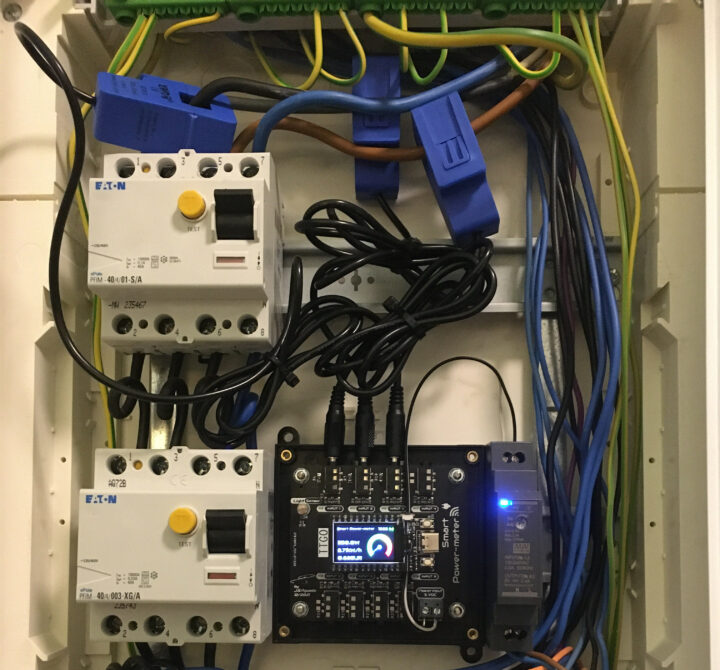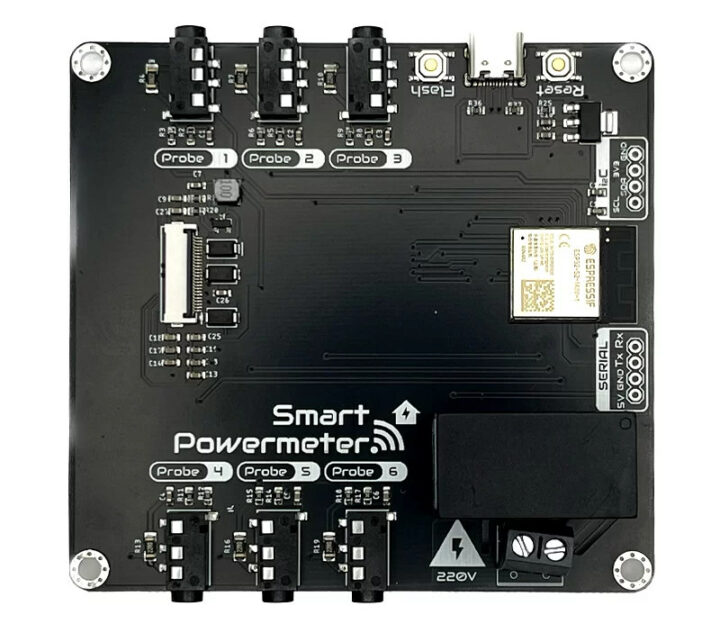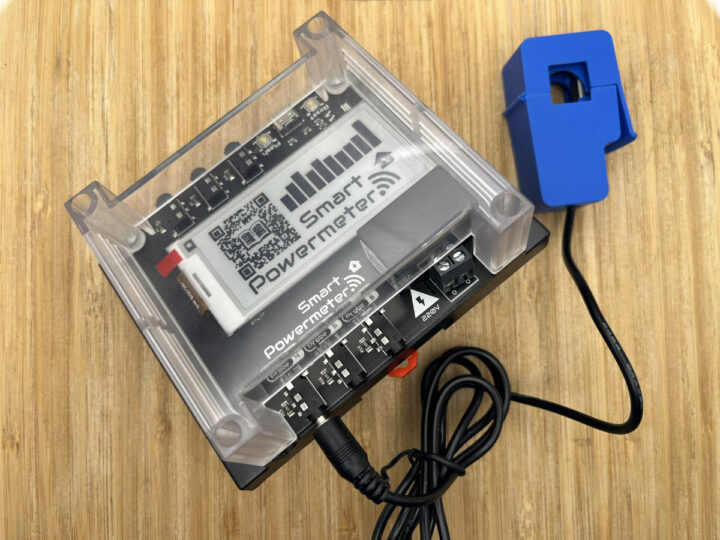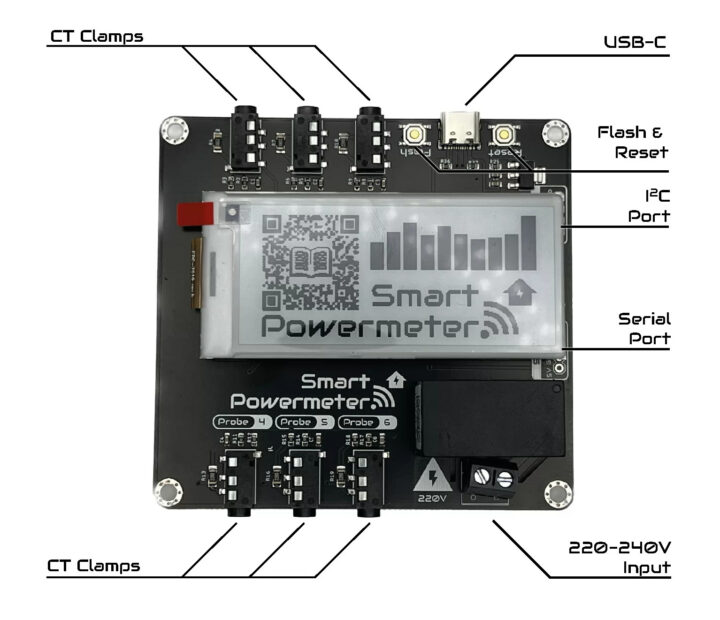J.G.Aguado’s “Smart Powermeter” is an ESP32-S2 board with a 2.9-inch e-paper display designed to measure power consumption through up to six CT clamps, or Current Transformer clamps, that are each attached to one of the AC lines of a house or appliance.
I used an MT87 Digital Clamp Multimeter nearly 10 years ago to easily and safely measure the power consumption of a whole house by simply clamping it on one of the cables outside and reading the results on the display. The Smart Powermeter works in the same way but can perform measurements for up to six devices, and besides seeing the results on the display the ESP32-S2 can also send the data to the cloud or local server for data gathering and analysis using ESPHome or Arduino firmware.
Smart Powermeter specifications:
- Wireless module – ESP32-S2-MINI-1-N4R2
- SoC – Espressif ESP32-S2FH4
- CPU
- Single-core 32-bit LX7 microcontroller @ up to 240 MHz
- RISC-V ultra-low-power co-processor
- 320 kB SRAM, 128kB ROM
- 2.4 GHz WiFi 4 connectivity
- CPU
- Memory – 2MB PSRAM
- Flash – 4MB flash
- PCB antenna
- SoC – Espressif ESP32-S2FH4
- Display – 2.9-inch e-Paper display
- USB – 1x USB Type-C port
- Sensors – Up to 6x SCT-013 series CT-clamps
- Other interfaces – UART and I2C headers
- Misc – Flash and Reset buttons
- Power Supply
- AC Input – 100-240VAC | 50-60Hz OR
- DC Input via USB – 5V @ 500mA for programming and testing purpose
- Dimensions
- Board – 92 x 87 x 20mm
- Enclosure – 115x90x40mm with enclosure
- Weight – 60grams, or 130grams with enclosure

The Smart Powermeter can be programmed with ESPHome firmware for easy integration with Home Assistant or the Arduino IDE for users wanting to develop their own firmware. You’ll find instructions to get started with either and more technical details on Readthedocs.io and GitHub.
J.G.Aguado used to sell small quantities of those on Tindie, but now the Smart Powermeter is available on Elecrow for $19.99 and up. But the lowest price is for the board only, and a complete system with display, enclosure, and six CT clamps goes for $61.96.


Jean-Luc started CNX Software in 2010 as a part-time endeavor, before quitting his job as a software engineering manager, and starting to write daily news, and reviews full time later in 2011.
Support CNX Software! Donate via cryptocurrencies, become a Patron on Patreon, or purchase goods on Amazon or Aliexpress







This is brilliant. I have been using a device I built myself to monitor power usage at a cottage but it was a pain in the butt. For $60 this is definitely worth it.
Yup! And clamps are so much safer than all those switches that (somehow) also measure power. Basically no skills needed to design this board and get it fcc/ce certified – even though I expect it not to be
It has potential, I also was looking for similar device – Zigbee option would be even better and a little bit more channels would be great to cover all exits of electrical cabinet (10 in my case) 😀
Also not clear, how complicated it could be to measure 3-phases with such meter?
Y’all should take a look at the emporia vue 2: similar hardware, but handles 16 circuits. And they have a three phase option. Can be reflashed with esphome, to take it out of the cloud and connect to local home automation
Thanks Ross, Emporia vue 2 seems much better option for typical smart home.
Shame we cant power it with 120 VAC for the USA. Also how do you purchase more probes?
It’s my understanding that it works in the US too.
You can search for “SCT-013 series” to get more probes.
I doubt that the quality of the measurements is high. I see no external ADC on the PCB so the internal ADC must be used. The ESP ADCs are noisy. Espressif suggests a data rate of 1 kHz, at 6 clamps and 50 Hz, this leads to 1000 / 50 / 6 is about 3 samples per AC cycle without possiblies for over sampling.
Hello,
Have you other recommended power-meter products?
Not really, what I see is that most people that need analogue-to-digital conversion rely on external ADC’s. The Texas Instruments ADS1015 and ADS1115 are popular devices. If you need high speed the ADS1015 (3300 SPS = samples per second, 12 bit resolution) is most suited. If you buy those on Aliexpress you (almost?) always get the ADS1115, which is slower (860 SPS) but 16 bit. Also reading the Aliexpress devices at full speed does not work, so I expect them to be clones. I am developing a two (genuine Texas Instruments) ADS1015 board with 2×5 screw terminals intended to read… Read more »
PZEM004T V3 and a ESPhome compatible MCU of choice (I make use of a ESP32 with Ethernet connected to 4 pzem units)
Does this measure by directional current. For example AC battery charging and discharging?
Cross reading the docs it seems to me this is only a smart CURRENT meter and not a power meter like it’s called.
Agree, to measure power you need current and voltage. Voltage is not measured. And the AC grid voltage is not constant nor has a fixed average (grid voltage is dependent on, among other factors, the demand on the cable and e.g.(solar panel) supply). So the best you can have is a rough estimate of the power by using a fixed value for voltage. Together with the bad current measurements due to noisy ADCs and the low sample frequency I reckon the overall results are bad.
So the pzem004t v3 for around $10 is still the go to solution in terms oft performance/buck. Paired with a ESP(home) and they rock the house…